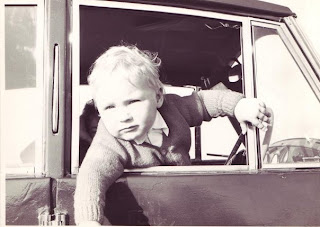After months of rehearsals, the curtain finally came up on the opening night of Franky Panky. And what a night it was. Fears of slow ticket sales proved unfounded and it was a near full Horfield Parish Hall that greeted the first note of Topsy Turvy. And what a bum note it was! We couldn't have made a worse start! But after that it all went really well. We belted out the songs with real passion and no small amount of talent - lyrics remembered, harmonies correctly executed - we performed the dance moves better than we ever have in rehearsals, and mostly we got our words right, more often than not in the right order and at the right time. Even the corniest gags, which came "thick and thin" as it says in the script, were lapped up by a hugely appreciative audience.
What a difference a few weeks makes. I have to admit there have been times in the last three months when I was ready to quit and thought the whole cast should pack up and go home. But, through a combination of hard work, dedication and sheer bloody-mindedness, it has all come together. I can only reiterate what I said in my previous post, that it's only been possible because we've all
worked together as a team: directors, cast, crew, tech team, musicians, partners, family and friends have all pulled together and supported each other. Certainly the more experienced actors that I share scenes with (and let's face it, nobody could be less experienced than me) have really helped me get through those scenes and, in a matter of weeks, turn it round from stuttering through with half remembered lines, to confidently projecting those lines, using the whole stage, getting the timing right and, yes, getting real belly laughs from the crowd. But it's also the little things. Geeing each other up backstage, helping out with the costume changes, keeping the morale ticking over, swapping little tips and sharing experiences, knowing when to offer help and when to leave people a bit of space. At the risk of sounding gushy, it's been a truly humbling experience to work with such a wonderful group of people.
What a difference a few weeks makes. I have to admit there have been times in the last three months when I was ready to quit and thought the whole cast should pack up and go home. But, through a combination of hard work, dedication and sheer bloody-mindedness, it has all come together. I can only reiterate what I said in my previous post, that it's only been possible because we've all
worked together as a team: directors, cast, crew, tech team, musicians, partners, family and friends have all pulled together and supported each other. Certainly the more experienced actors that I share scenes with (and let's face it, nobody could be less experienced than me) have really helped me get through those scenes and, in a matter of weeks, turn it round from stuttering through with half remembered lines, to confidently projecting those lines, using the whole stage, getting the timing right and, yes, getting real belly laughs from the crowd. But it's also the little things. Geeing each other up backstage, helping out with the costume changes, keeping the morale ticking over, swapping little tips and sharing experiences, knowing when to offer help and when to leave people a bit of space. At the risk of sounding gushy, it's been a truly humbling experience to work with such a wonderful group of people.
And what has it all been for? The absolute buzz of getting up on stage last night and doing what we've all been working towards over the past three months, in front of an appreciative and responsive audience of family, friends and complete strangers. The thrill of getting laughs from the crowd (OK, maybe it was the purple velvet flares, rather than any actual talent), seeing them dancing in the aisles to Time Warp and hearing the applause during the final bows. And most of all the sense of what we, as a group, have achieved.
Let's hope there isn't a sense of anti-climax around the second show tonight and that the rest of the week is just as rewarding. I'm definitely looking forward to the end of run party on Saturday night!
Let's hope there isn't a sense of anti-climax around the second show tonight and that the rest of the week is just as rewarding. I'm definitely looking forward to the end of run party on Saturday night!
Horfield Theatre Company presents Franky Panky, a pantomime by Graham Barraclough
Horfield Parish Hall, Wellington Hill, Bristol BS7 8ST
Weds 26th to Sat 29th Oct. 7.30 each night and 2.30 Sat matinee
£8 adults/£6.50 conc/£25 family (2+2)
Horfield Parish Hall, Wellington Hill, Bristol BS7 8ST
Weds 26th to Sat 29th Oct. 7.30 each night and 2.30 Sat matinee
£8 adults/£6.50 conc/£25 family (2+2)
Tickets from www.horfieldtheatre.co.uk/tickets.htm or 07597 085934










